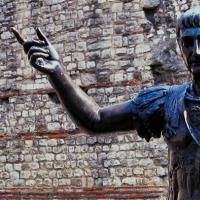Nasser Gamal Abdel: biography
It is impossible to understand the present without knowing history, studying the causes of the emergence of objective reality. Often the events of the past are repeated, unwinding in a spiral and repeating in a certain cycle. A few years ago, a coup took place in Egypt, as a result of which the highest military officials and generals came to power, who carried out a massive cleansing among Islamist organizations. The same thing happened in the history of the country in the distant fifties, when one of the brightest and most charismatic leaders of the Arab world of the twentieth century, Gamal Abdel Nasser, whose biography is inextricably linked with the most important political events of the middle of the century, emerged on the political arena.
Becoming a national leader
In 1918, a boy was born into the family of a modest postal clerk from Alexandria, who was destined to become one of the most popular Egyptian statesmen of all time. Nasser Gamal Abdel grew up in the difficult environment of a changing world. His worldview was formed under the strong influence of Arab nationalism, Marxism, the Koran.
In those years, Egypt was practically under the direct rule of Great Britain, the powerful Suez Company had the opportunity to approve the composition of the government of the country.
Even in his youth, Nasser Gamal Abdel took in numerous speeches against the current government. Dreaming of changing the situation and being involved in the affairs of the country, he understood that only military service could become a springboard for him into politics.
In 1937, on the second attempt, he entered the Military Academy. After graduation, Nasser was sent to serve in the Mackabad garrison, where a group of patriotic officers gradually formed, who were offended by the dependent position of the Arab nation in the world. Abdel Gamal soon rose to prominence and became the leader of this group.
In 1948, the officer gained combat experience by participating in the Arab-Israeli war.
Gamal Abdel Nasser. Interesting facts about the leader of the Egyptian revolution
The Society of Free Officers soon became the core of the force that would sweep away the existing regime on July 23, 1952. This was a military coup that brought representatives of the middle and high command of the army to power.
Naguib became the president of the country. However, he became only a temporary figure at the head of Egypt. The real power was in the hands of the Revolutionary Command Council. The real leader of this body, Nasser Gamal Abdel, began to actively advocate for radical reforms in the country.
As in all agrarian countries, the land issue was acute in Egypt.

The support of the population directly depended on how the new government would divide the fertile plots in the country. Thanks to Nasser, the landless fellahs finally got their own land allotments. He also considered the nationalization of foreign enterprises to be one of the main conditions for liberation from the remnants of the colonial regime.
Rise to power
At the same time, Nasser Gamal Abdel severely restricted civil rights and freedoms in Egypt, thus becoming a demonic figure for liberal historians. All political parties and movements outside the Liberation Congress, a body headed by Nasser, were banned.
Naguib began to distance himself from such radical reforms, and a second wave of revolution soon broke out. In 1954, Nasser Abdel Gamal eventually came to power. The new leader began cracking down harshly on the Islamist groups of the Muslim Brotherhood, which sixty years later will be repeated by the current leader of Egypt, Al-Sisi.
Ideologist of Arab socialism
Every European ideology takes on very bizarre features in the peculiar conditions of the East. Nasser Gamal Abdel began to put into practice in Egypt the ideas of so-called Arab socialism. The result of this was the rise of agriculture, the industrialization of the country. The leader of the country began to pay attention to universal education and the development of healthcare.
Not being a Marxist, the second president of Egypt severely persecuted Arab communists, as well as representatives of other ideologies incompatible with the ideas of universal Arab unity. However, he was a supporter of the methods of the Soviet Union to control the economy by the state, the planning system, and actively introduced these methods in Egypt.

Under him, the policy of nationalization of foreign companies and assets was actively implemented.
The first years of Nasser's reign were a time of rapid economic growth. Schools, hospitals, factories were built. However, as in all countries with a rigid centralized management of the economy, peculiar excesses were inevitable. Many businesses operated at a loss and did not close just to avoid unemployment.
The idea of creating agricultural complexes on the territory of lands reclaimed from the desert also failed. The infrastructure existing there required huge subsidies and could not pay off with any of the highest yields.
Suez Crisis
The main target of the nationalization policy was the Suez Canal. The company that ran it was not subject to the government, and under the previous regime, it even actually approved the composition of the cabinet of ministers. The President of Egypt could not come to terms with the existence of a de facto independent state within the country.
After the US refused to sponsor the construction of the Aswan Dam, Nasser Gamal Abdel decided to cut the Gordian knot and in 1956 announced the nationalization of the Suez Canal. At the same time, fair compensation was paid to all shareholders of the company.

France and Great Britain could not come to terms with the loss of such a strategically important and incredibly profitable asset. Together with Israel, they developed a secret plan for the invasion of the Sinai Peninsula, which took place in 1959.
Military service was considered honorable under President Nasser, but the combat effectiveness of the Egyptian army was significantly inferior to the Israeli one. In a matter of days, the Sinai Peninsula was occupied and the Suez Canal was taken under control. The air force and armored formations of Egypt were pulverized.
However, having suffered a crushing military defeat, Nasser Abdel Gamal won a complete political victory. The nationalization of the Suez Canal was recognized by the UN. In addition, military operations in this region did not suit both superpowers - the USSR and the USA. After a menacing shout from the American and Soviet sides, the intervention was stopped. After the introduction of UN emergency troops, the armed forces of the anti-Egyptian coalition were withdrawn from the region.
Paradoxically, after the military defeat, the popularity of the former lieutenant colonel of the Egyptian army in the Arab world only increased.
six day war
On June 5, 1967, Israel began another chapter in its confrontation with Egypt. For six days, the Sinai Peninsula, the Golan Heights, the West Bank of the Jordan River, and the Gaza Strip were occupied. Egypt suffered another crushing defeat from the eternal enemy. Acutely experiencing the tragedy, Nasser Abdel Gamal announced his resignation on June 9. However, after spontaneous marches in support of the national leader, he agreed to return to the post.
Realizing that further military confrontation would lead to the complete collapse of Egypt, he signed a ceasefire agreement, causing an uproar in his address. After the war, Nasser Abdel Gamal focused on the modernization and rearmament of the army, in which he was actively assisted by the Soviet Union and Saudi Arabia. As a result, by 1973, the country had already acquired a relatively combat-ready army, which, in alliance with the Syrian troops, was able to adequately resist the Israelis.

However, this conflict occurred after the death of the president, who died suddenly in 1970.
Nasser Abdel Gamal is still a cult figure in the Arab world. He was one of those leaders who actually believed in what they were doing. Nasser Abdel Gamal significantly limited foreign influence in the country, returned to the Arabs their lost self-esteem and self-confidence.


